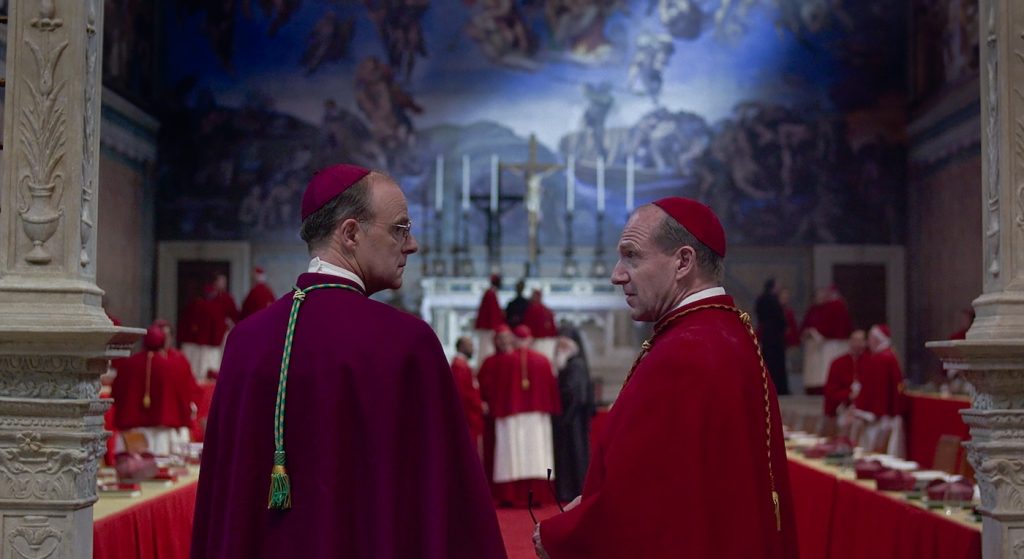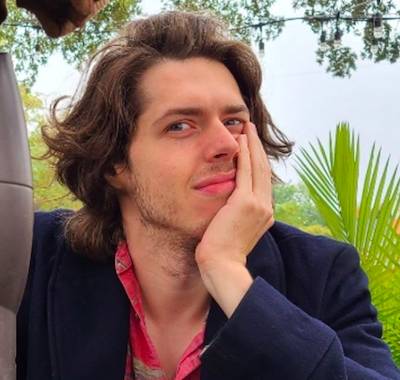“Conclave” Oscar Nominee Peter Straughan on Scripting a Devilishly Good Vatican Thriller
Conclave is great, gripping entertainment from the first shot to the last. It’s a drama, both honest and escapist, deftly shot, performed, and staged by artists at the top of their respective games. In the hands of Academy Award-nominated screenwriter Peter Straughan, Edward Berger’s contemplative film moves briskly within the Vatican walls. A movie that takes us into one of the most secretive rituals on Earth – about the search for a new pope – is remarkably light on its holy feet.
Cardinal Lawrence (Ralph Fiennes) is the eyes, ears, and heart for the audience. After the loss of the pope, the faith-in-crisis cardinal heads the conclave. He digs through the past of the nominees for pope as he does what he can to rally a nomination for his trusted friend, a more forward-thinking man of faith, Cardinal Bellini (Stanley Tucci). Conclave is not just a drama, but a detective story about unearthing secrets and sins.
Straughan is no stranger to crafting worlds shrouded in secrecy and fueled by ambitious, mistrustful men. He tackled espionage in Tinker Tailor Soldier Spy and the indie music world with the undersung Frank. With Conclave, he tells the story of men in power who find themselves powerless in the eyes of God.
Let’s start with Lawrence’s homily about doubt. It’s beautiful. What did your first pass at that scene look like?
That homily has stayed the same pretty much throughout the drafts, and it’s quite close to the book. I mean, that was the reason I wanted to do this. When I was reading the book, I remember reaching that point and thinking, “I definitely want to do this.” I really loved that homily. It was quietly radical to be uncertain and to be okay with that. Generally, with dialogue and monologues from books, the adaptation process is just one of hearing it and thinking about it: Is it going to feel awkward for an actor, or is it going to feel smooth? It’s obviously easier with the homily because it’s meant to be a delivered sermon rather than naturalistic dialogue. You’ve got a bit of flexibility.
Is it interesting to you that, even though the homily in the movie is divisive, most Catholics are moved by that scene?
I’ve been pleased, in general, by the response to the movie. I wasn’t sure how much pushback there might be from Catholics or how much pushback there might be about the ending from other communities. Overwhelmingly, the response I’ve had personally has been very positive, which has been lovely. I find it heartwarming that people have embraced that message because it’s a hopeful message. Maybe in the world we find ourselves in now, that’s become a more and more attractive message. We’ve seen the evils of certainty.
As dialogue-heavy as the movie is, the silences – the breath, especially – say a lot. On the page, what did you want to leave unsaid?
With adaptation, or just with screenwriting generally, it’s about what has to be said and what can be left unsaid. The more you can leave unsaid, the more interesting it is. Generally, I think the difference between a good script and a bad script is that a bad script has everything on the surface, whereas a good script works with subtext and engages the audience. Then they’re reading, they’re decoding the scene, and working out what’s going on.
Actors of this caliber understand that well, too, right?
With actors like John [Lithgow], Stanley, Ralph, and Isabella [Rossellini], I was there on set cutting lines a lot because you don’t need them with those actors. Sometimes, the dialogue can feel like scaffolding – it’s being put up for the scene – but the stronger the actor is, the more you can dismantle some of that scaffolding and let them do it just with their eyes or small expressions.
Was the act of listening a major theme for you when writing?
In a way, Ralph’s character is struggling with doubt. He prays and doesn’t feel that he gets an answer, and he’s listening all the time for an answer. Silence felt important from the beginning, and listening felt like an important trope that we were going to use throughout the film. I was always aware of people listening through doors or walls or listening and only hearing silence. Edward picked that up and ran with it as well. After we’d shot it, he had Ralph record his breathing throughout the whole film so that Ralph would be present there. It’s a lovely soundscape that he created.

As close as we are to the main character, Lawrence, he’s still such a mystery. Did you see the questions around him as the detective work for the audience?
I’ll tell you, Lawrence was a mystery to himself. When we start with him in the film, he’s been burdened. He’s stuck with this job of having to run the conclave, which he didn’t want. He wants to leave Rome altogether. He’s struggling with his faith. He feels as if the Pope doesn’t respect him. The Pope says he’s a manager, not a shepherd. And he says he has no ambition whatsoever of being Pope. But then what he discovers, kind of like the ring in The Lord of the Rings: If you’re there long enough, it’ll seduce you in the end.
Do you think that desire was always there from the beginning, that maybe he was fooling himself?
I always think it’s interesting because he says to Stanley’s character at one point, “Not me. I don’t want to be Pope.” And Stanley says, “Every cardinal wants to be Pope.” And later on, Lawrence says, “If I were Pope, I’d be called John.” You realize that he has thought about it, that it has been in his head so that he didn’t really realize that ambition. He wasn’t very different from the others. The detective isn’t that different from the criminals. But then the other thing I love about it is that he’s essentially a conservative. He wanted to run the conclave with as little drama as possible. Initially, he’s horrified that there’s any scandal. He wishes it would go away and doesn’t want to do anything about it. But there’s some spark of conscience and genuineness, the courage of faith, that wakes up in him. He ends up being this conservative man disrupting the whole system.
It’s also a hilarious movie about the comedy of ego. How’d you approach the comedic timing and behavior?
There’s something about them being these serious and solemn, supposedly important people. As someone said, it’s basically Mean Girls in the Vatican, and that’s great. Because the flip side of Mean Girls is that they’re just people. They’re flawed people like us. I have sympathy for them. They’re not operatic villains; they’re just ordinary, deeply flawed individuals.
With the detective work, audiences question every move and every image. For example, the ending: There’s hope there, but a lot left to question, maybe even fear. Was that always the final image?
That’s one of the reasons why I love cinema. Even though I’m a writer – so primarily, I deal with words – I love the inflected image because it’s so powerful. You can read into it in so many ways. That shot of the three nuns is the closing shot of the film. It was just a shot that Edward sort of came up with, and then, in the edit, we found it. It wasn’t originally going to be how the film ended, but it made sense. Everything had been shut down and closed for the conclave, and now, finally, the shutters are opening. With this new Pope, is everything going to be different? And then something about these women – who have been silent throughout the film and forced to be in the background – seeing those three young nuns skipping down the stairs, chatting and laughing with each other, I thought it was a beautiful way of hinting at optimism and new hope.
For more on Conclave, check out these stories:
“Conclave’s” Oscar-Nominated Costume Designer Lisy Christl on the Fashion of Faith
Featured image: Ralph Fiennes stars as Cardinal Lawrence in director Edward Berger’s CONCLAVE, a Focus Features release. Credit: Courtesy of Focus Features. © 2024 All Rights Reserved.



